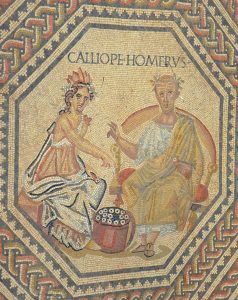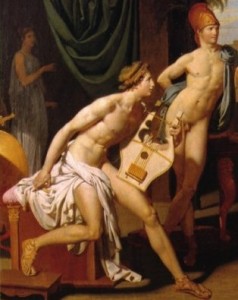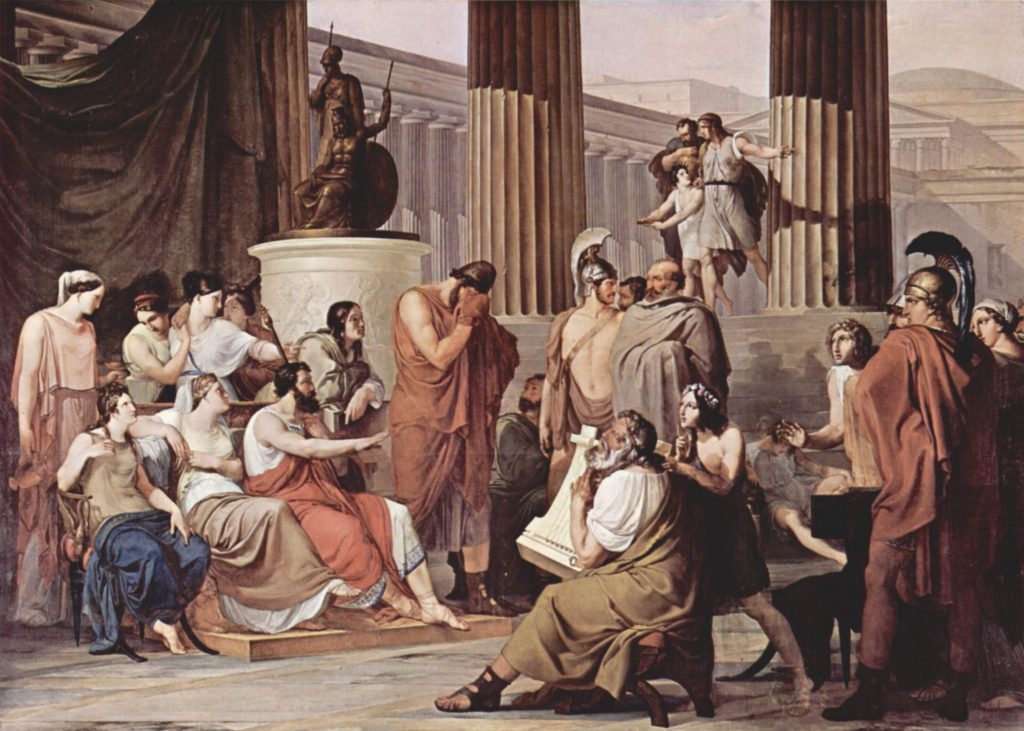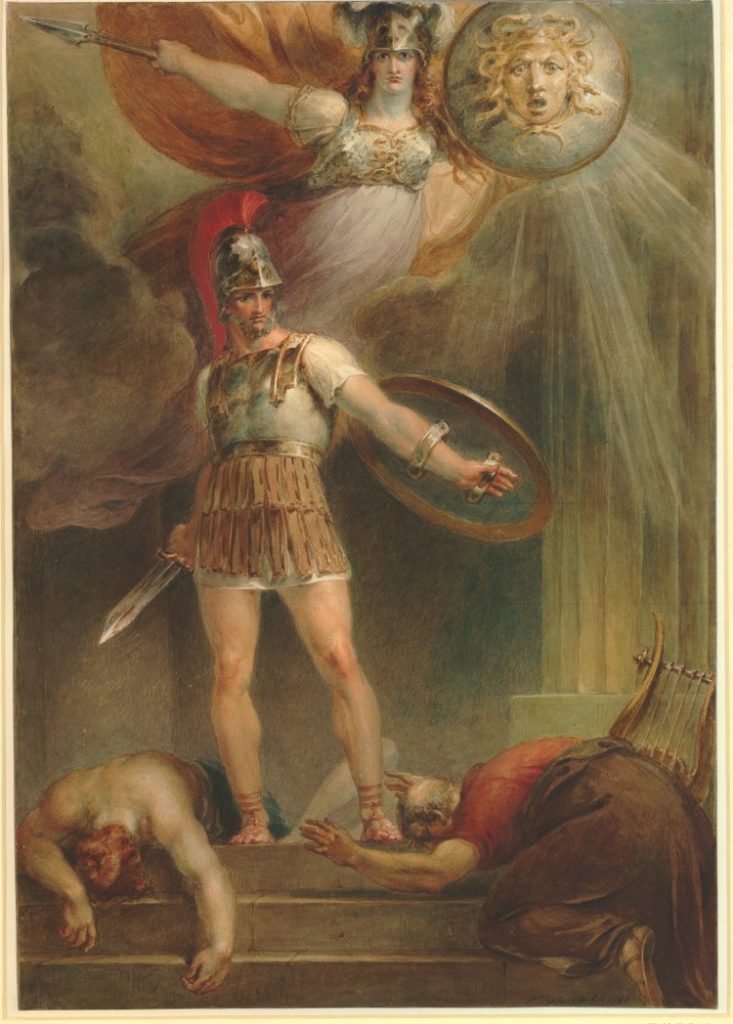In a dialogue of Plato, Ion, the character Ion is a famous rhapsode. He is just coming back from a famous festival in Epidaurus where he performed Homeric poetry. [1] Plato’s dialogue dates from the late 5th century BCE [2], but it is not easy to find specific information about rhapsodes from the archaic period. The word rhapsōdos [ῥαψῳδός] itself is not used in Homeric or Hesiodic poetry. The word used there is aoidos [ἀοιδός] ‘singer’.

From the Bronze Age period, we may look at what we find in Homeric poetry, where there are several examples of singers performing. So in this post we will focus on the aoidos as featured in epics themselves.
In epic the Master Narrator invokes a god or Muse at the beginning, which denotes a divine element in the song and sets the theme.
Anger [mēnis], goddess, sing [aeidein] it, of Achilles, son of Peleus
Iliad 1.1, adapted from Sourcebook [3]
The wording refers to the epic as being a song, and the performance being sung.
In the Iliad we hear about a bard during the Catalogue of Ships:
The men of Pylos and lovely Arene, and Thryon where is the ford of the river Alpheus; strong-built Aepy, Kyparisseis, and Amphigenea; Pteleon, Helos, and Dorion, where the Muses [595] met Thamyris, and stilled his minstrelsy [aoidē] for ever. He was returning from Oikhalia, where Eurytos lived and reigned, and boasted that he would surpass even the Muses, daughters of aegis-bearing Zeus, if they should sing [aeidein] against him; whereon they were angry, and maimed him. [600] They robbed him of his divine power of song [aoidē], and thenceforth he could strike the lyre [kithara] no more. These were commanded by Nestor, charioteer of Gerenia, and with him there came ninety ships.
Iliad 2.591–602, adapted from Sourcebook
As with other circumstances, it is clear that a mortal cannot overreach their abilities when it threatens the immortals without facing the consequences, as with a warrior at his aristeiā.
Hesiod meets the Muses in more favorable circumstances:
22 [It was the Muses] who taught me, Hesiod, their beautiful song [aoidē]. 23 It happened when I was tending flocks of sheep in a valley of Helikon, that holy mountain. 24 And the very first thing that the goddesses said to me, 25 those Muses of Mount Olympus, those daughters of Zeus who holds the aegis, was this wording [mūthos]: 26 “Shepherds camping in the fields, base objects of reproach, mere bellies! 27 We know how to say many deceptive things looking like genuine [etuma] things, 28 but we also know how, whenever we wish it, to proclaim things that are true [alēthea].” 29 That is how they spoke, those daughters of great Zeus, who have words [epea] that fit perfectly together, 30 and they gave me a scepter [skēptron], a branch of flourishing laurel, 31 having plucked it. And it was a wonder to behold. Then they breathed into me a voice [audē], 32 a godlike one, so that I may make glory [kleos] for things that will be and things that have been, 33 and then they told me to sing [humnein] how the blessed ones [makares = the gods] were generated, the ones that are forever, 34 and that I should sing [aeidein] them [= the Muses] first and last.
Hesiodic Theogony 22–34, adapted from Sourcebook
In the Odyssey there are two bards named, with evidence about their performance. We can also see how other people react and interact with them.
Demodokos the bard of Alkinoos and Arete, for example, performs three times. Here is how he is initially introduced. Alkinoos says:
“…we will have the divine bard [aoidos] Demodokos; for the god has granted song [aoidē] to him [45] to bring delight, whatever he may choose to sing [aideîn] about.”
Alkinoos then led the way, and the others followed after, while a herald went to fetch Demodokos. …
62 The herald came near, bringing with him a singer [aoidos], very trusted, 63 whom the Muse loved exceedingly. She gave him both a good thing and a bad thing. 64 For she took away from him his eyes but gave him the sweetness of song [aoidē]. [65] For him did Pontonoos place a chair, silver studded, 66 right in the midst of the people who were feasting, propping the chair against a tall column, 67 and the herald took from a peg the clear-sounding phorminx that was hanging there 68 above his head, and he presented it to him so he could take it in his hands. 69 The herald did this. And next to him he [= the herald] put a beautiful basket and a table. [70] He put next to him also a cup of wine to drink from whenever he [= Demodokos] felt in his heart the need to do so. 71 And, with hands reaching out swiftly, they made for the good things that were prepared and waiting.72 When they had satisfied their desire for drinking and eating, 73 the Muse impelled the singer [aoidos] to sing the glories [kleos plural] of men, 74 starting from a thread [oimē] [of a song] that had at that time a glory [kleos] reaching all the way up to the vast sky.
Odyssey 8.43–47, 62–74, adapted from Sourcebook
As before, the performer has his gift from the Muse, but as with the history of Thamyris in Iliad 2, Demodokos’ backstory indicates that there can be limitations imposed on such gifts.
There are other passages in which Demodokos appears, and his stories are outlined within the narrative. In what ways do the descriptions of the singer and of his songs build up a picture of the singer’s role and methods within epic?
In the Odyssey we hear about an unnamed bard whom Agamemnon left with his wife. When Aegisthus makes his approaches to Clytemnestra:
[265] At first she would have nothing to do with his wicked scheme, for she was of a good natural disposition; moreover there was a singer [aoidos] with her, to whom Agamemnon had given strict orders on setting out for Troy, that he was to keep guard over his wife; but when the gods had counseled her destruction, [270] Aegisthus led this bard [aoidos] off to a desert island and left him there for crows and seagulls to batten upon—after which she went willingly enough to the house of Aegisthus. Then he offered many burnt sacrifices to the gods, and decorated many temples with tapestries and gilding, [275] for he had succeeded far beyond his expectations.
Odyssey 3.265–275, adapted from Sourcebook
Presumably, unlike Demodokos, this bard is not blind. As an observer he would also be able to sing about anything that happened during Agamemnon’s absence. Is the role of a bard as singer compatible with other duties?
In Ithaka, the featured singer is Phemios. He is first seen singing in Odyssey 1.150–155, but later Penelope wishes him to stop that particular song (1.337–344). Telemachus, however, defends the singer. We see Phemios again, much later, after Odysseus and Telemachus have killed the suitors. Here he makes a plea for his life and suggests a bard is important:
[330] The minstrel [aoidos] Phemios, son of Terpes—he who had been forced by the suitors to sing [aeidein] to them—now tried to save his life. He was standing near towards the trap door, and held his lyre in his hand. He did not know whether to flee out of the hall and sit down by the altar of [335] Zeus that was in the outer court, and on which both Laertes and Odysseus had offered up the thigh bones of many an ox, or whether to go straight up to Odysseus and embrace his knees, but in the end he thought it best to embrace Odysseus’ knees. [340] So he laid his lyre [phorminx] on the ground between the mixing-bowl and the silver-studded seat; then going up to Odysseus he caught hold of his knees and said, “Odysseus, I beseech you have mercy on me and spare me. [345] You will feel grief [akhos] for it afterwards if you slay a bard [aoidos] who can sing [aeidein] both for gods and men as I can. I am self-taught, and the gods visit me with every kind of lay [oimē]. I would sing [para–aeidein] to you as though you were a god, do not therefore be in such a hurry to cut my head off. [350] Your own son Telemachus will tell you that I did not want to frequent your house and sing [aeidein] to the suitors after their meals, but they were too many and too strong for me, so they made me.”
Odyssey 22.330–353, adapted from Sourcebook
Why have the suitors been making him perform? Why does Penelope want him to stop? What is the role of Telemachus? What do the descriptions of Phemios tell us about singers? What does Phemios’ speech here suggest about the role of the bard, and to what extent does he go on to fulfill it later on?
We see another singer at the marriage of Hermione:
[15] So they feasted throughout the big palace with its high ceilings, 16 both the neighbors and the kinsmen of glorious Menelaos, 17 and they were feeling delight [terpesthai]; in their midst sang-and-danced [melpesthai] a divine singer [aoidos], 18 playing on the special lyre [phorminx]; two special dancers [kubistētēre] among them 19 were swirling as he led [exarkhein] the singing-and-dancing [molpē] in their midst.
Odyssey 4.15–19, Sourcebook
Is this a different kind of performance than the other situations we have seen, or just part of the overall repertoire of aoidoi as depicted in epic?
 In the Iliad there is evidence of performance when the embassy arrives to find Achilles singing the klea andrōn with Patroklos waiting for his turn. Like the bards in the other passages, Achilles is using a lyre [phorminx].
In the Iliad there is evidence of performance when the embassy arrives to find Achilles singing the klea andrōn with Patroklos waiting for his turn. Like the bards in the other passages, Achilles is using a lyre [phorminx].
186 and they found Achilles diverting his heart [phrēn] as he was playing on a clear-sounding lyre [phorminx], 187 a beautiful one, of exquisite workmanship, and its cross-bar was of silver. 188 It was part of the spoils that he had taken when he destroyed the city of Eëtion, 189 and he was now diverting his heart [thūmos] with it as he was singing [aeidein] the glories of men [klea andrōn]. [190] Patroklos was the only other person there. He [= Patroklos] sat in silence, facing him [= Achilles], 191 and waiting for the Aeacid [= Achilles] to leave off singing [aeidein].
Iliad 9.186–191, Sourcebook
One thing that is significant here is that they are performing in relay, which will also be a feature in the rhapsodic performance[4]—the subject of our next blog post.
Is he performing lyric or epic? The phorminx used by Achilles is described in detail. Does a singer as depicted in Homeric and Hesiodic poetry have to perform with a lyre, or are other types of performance also part of the epic tradition?
There are stories told by those who are not bards as such, and without the use of instruments. For example when the ambassadors are trying to persuade Achilles to return and help the Achaeans, Phoenix uses a narrative about Meleagros to illustrate his case:
524 This is how [houtōs] we [= I, Phoenix] learned it, the glories [klea] of men [andrōn] of an earlier time [prosthen], [525] who were heroes [hērōes], whenever one of them was overcome by tempestuous anger. 526 They could be persuaded by way of gifts and could be swayed by words 527 I totally recall [me-mnē-mai] how this was done—it happened a long time ago, it is not something new— 528 recalling exactly how it was. I will tell it in your company—since you are all near and dear [philoi].
Iliad 9.524–528, Sourcebook
He does not invoke a Muse [5] but it is a formal “speech act” introducing an ainos, indicated by his introductory “This is how [houtōs]”[6]
For example, on the battlefield Glaukos encounters Diomedes, who asks for his lineage:
And the shining son of Hippolokhos answered, [145] Son of Tydeus, you with the great thūmos! Why do you ask about my lineage [genēē]? 146 The genēē of men is like the genēē of leaves. 147 Some leaves are shed on the earth by the wind, 148 while others are grown by the greening forest—and the season [hōrā] of spring is at hand. 149 So also the genēē of men: one grows, another wilts. [150] If, then, you would learn my descent, it is one that is well known to many.
Iliad 6.144–150, Sourcebook
This is a micro-narrative, and again, he does not invoke a Muse. But it is a formal recitation, and if it is well known then this story—about Bellerophon—is presented as it it would have been performed in other contexts.
Do the singers or bards perform only at particular types of gathering? Can others take the role of the bard? Are the micro-narrative performances of stories still presented as if they were songs in the same way as those performed by singers?
There are many questions as yet unanswered, so please join us in the forum to explore further how singers and performance are represented in Homeric and Hesiodic epic!
Coming next time: later references to performers
Selected vocabulary related to singers in epic
aeidein [ἀείδειν] sing
aoidē [ἀοιδή] song
aoidos [ἀοιδός] singer, minstrel, bard
humneîn [ὑμνεῖν] sing, laud
kithara [κιθάρα] type of lyre
oimē [οἴμη] song, lay, thread of song
phorminx [φόρμιγξ] type of lyre
rhapsōdos [ῥαψῳδός] reciter of epic poems
References
[1] Plato Ion 530a. W.R.M. Lamb. 1925. Plato in Twelve Volumes, Volume 9, Harvard University Press, Cambridge, MA,; William Heinemann Ltd, London. Available online at Perseus
[2] H24H 0§45. Nagy, Gregory. 2013. The Ancient Greek Hero in 24 Hours. Harvard University Press, Cambridge, MA: 2013. Available online at CHS.
https://nrs.harvard.edu/urn-3:hul.ebook:CHS_NagyG.The_Ancient_Greek_Hero_in_24_Hours.2013
[3] Sourcebook: The Ancient Greek Hero in 24 Hours Sourcebook of Original Greek Texts Translated into English, Gregory Nagy, General Editor. 2018.08.06. Available online
[4] H24H 8§31.
[5] Further discussion about invoking the Muses, and whether micro-narratives require such an invocation, featured among the subjects of this video, recorded as part of the HeroesX Office Hours: CHS Dialogue | The super-muse of the Iliad, with Gregory Nagy.
Topics include: the singularity or multiplicity of the Muse(s) in the Iliad; divine inspiration; authority; the question of locales, occasions/festivals, and presiding deities at performances of the epic poetry; the Iliad as a super-genre, combining multiple genres; the narrative of Phoenix; speaking in turn and out of turn.
[6] H24H 2§60. Further discussion about speech acts are included in the video CHS Dialogue with Leonard Muellner | Speech acts, women in epic, integration of opposites.
Muellner refers to John R. Searle’s work on speech acts. See for example “What is a Speech Act?” from Hutchby, I. 2008. Pragmatics, Discourse Analysis and Sociolinguistics. Sage. Los Angeles. Available online:
https://faculty.unlv.edu/jwood/unlv/Articles/SearleWhatIsASpeechAct.pdf
Online texts and videos accessed October 16 2018.
Image credits
Detail from Carole Raddato (photo) Central medallion of the Vichten mosaic, depicting Calliope, the Muse of epic and elegiac poetry, together with Homer, around 240CE. National Museum of History and Art, Luxembourg. Creative Commons CC BY-SA 2.0, via Flickr.
Yorck Project. 2002. Francesco Hayez Odysseus at the court of Alkinoos, 1814–1815, Public domain, via Wikimedia Commons
William Hamilton Ulysses, having slain the Suitors, spares Phemius, illustration to Odyssey 22. Watercolor, 1796. Creative Commons CC BY-NC-SA 4.0 1859,0312.108, AN215634001 © The Trustees of the British Museum
Detail from Ingres Achilles Receiving the Envoys of Agamemnon, 19th century, public domain via Wikimedia Commons
Note: Images have been selected from pictures that are freely available with open source or Creative Commons licenses or from photographs sent in by community members for the purpose. The images in this post are intended to suggest the subject, rather than illustrate exactly—as such, they may be from other periods, subjects, or cultures. Attributions are based where possible by those shown by museums, or on Wikimedia Commons, at the time of publication on this website. Images accessed October 16 2018.
___
Hélène Emeriaud, Janet Ozsolak, and Sarah Scott are members of the Kosmos Society.

